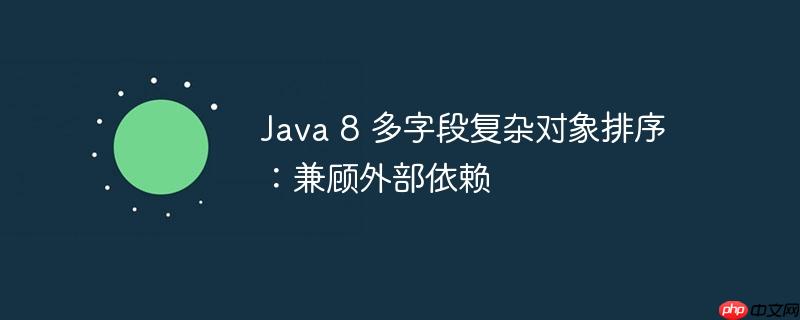
在Java 8中,Comparator接口引入了许多便捷的静态方法和默认方法,极大地简化了对象集合的排序操作。其中,Comparator.comparing()用于基于某个提取器(如方法引用或Lambda表达式)创建初始的比较器,而thenComparing()则允许我们在此基础上添加后续的排序规则,形成一个优先级链。
例如,如果我们有一个Person类,包含age和yearsOfEducation字段,我们可以这样进行排序:
public class Person {
private int age;
private int yearsOfEducation;
public Person(int age, int yearsOfEducation) {
this.age = age;
this.yearsOfEducation = yearsOfEducation;
}
public int getAge() { return age; }
public int getYearsOfEducation() { return yearsOfEducation; }
@Override
public String toString() {
return "Person{age=" + age + ", education=" + yearsOfEducation + "}";
}
}
// 排序示例
List<Person> persons = Arrays.asList(
new Person(26, 3),
new Person(30, 4),
new Person(28, 5),
new Person(28, 5)
);
Collections.sort(persons, Comparator.comparing(Person::getAge)
.thenComparing(Person::getYearsOfEducation));
// 结果将按年龄升序,年龄相同时按教育年限升序上述方法对于直接可从待排序对象获取的属性非常有效。然而,在实际开发中,我们可能会遇到一种情况:某个排序条件并不直接存在于待排序对象自身,而是需要通过一个外部对象的方法来计算或获取。
考虑以下场景:我们有一个Person列表,需要首先按年龄排序,然后按教育年限排序,最后按在该Employer处的工作年限排序。而getYearsOfEmployment(Person p)方法属于Employer类,而非Person类。
立即学习“Java免费学习笔记(深入)”;
public class Employer {
// 假设Employer内部维护了Person到工作年限的映射
// 实际场景可能通过数据库查询或其他业务逻辑获取
public int getYearsOfEmployment(Person p) {
// 模拟逻辑,实际应根据p的具体信息返回
if (p.getAge() == 28 && p.getYearsOfEducation() == 5) {
// 区分p3和p4
if (p.toString().contains("p3")) return 10; // 假设p3的标识
if (p.toString().contains("p4")) return 8; // 假设p4的标识
}
return p.getAge() / 3; // 示例逻辑
}
}在这种情况下,thenComparing(Person::getYearsOfEmployment)是行不通的,因为Person类没有getYearsOfEmployment方法。解决方案是利用thenComparing接受一个Function或ToIntFunction(如果返回的是int类型)的特性,并结合方法引用。
关键在于,thenComparing可以接受一个方法引用,该方法引用指向一个特定对象的实例方法,并且该实例方法以待排序对象作为参数。
假设我们有一个Employer实例employer,我们可以这样构造完整的排序链:
import java.util.Arrays;
import java.util.Collections;
import java.util.Comparator;
import java.util.List;
public class SortingWithExternalDependency {
// Person 类定义 (同上)
public static class Person {
private int age;
private int yearsOfEducation;
private String id; // 用于区分相同age和education的Person
public Person(int age, int yearsOfEducation, String id) {
this.age = age;
this.yearsOfEducation = yearsOfEducation;
this.id = id;
}
public int getAge() { return age; }
public int getYearsOfEducation() { return yearsOfEducation; }
public String getId() { return id; }
@Override
public String toString() {
return "Person{" +
"id='" + id + '\'' +
", age=" + age +
", education=" + yearsOfEducation +
'}';
}
}
// Employer 类定义 (同上)
public static class Employer {
public int getYearsOfEmployment(Person p) {
// 模拟根据Person的ID返回不同的工作年限
switch (p.getId()) {
case "p1": return 5;
case "p2": return 7;
case "p3": return 10;
case "p4": return 8;
default: return 0;
}
}
}
public static void main(String[] args) {
// 初始化数据
Employer employer = new Employer();
Person p1 = new Person(26, 3, "p1");
Person p2 = new Person(30, 4, "p2");
Person p3 = new Person(28, 5, "p3");
Person p4 = new Person(28, 5, "p4");
List<Person> persons = Arrays.asList(p1, p2, p3, p4);
System.out.println("原始列表: " + persons);
// 使用Comparator链和方法引用进行排序
Collections.sort(persons, Comparator.comparing(Person::getAge)
.thenComparing(Person::getYearsOfEducation)
.thenComparing(employer::getYearsOfEmployment));
System.out.println("排序后列表: " + persons);
// 预期输出顺序:p1, p4, p3, p2
// p1: age=26, education=3, employment=5
// p4: age=28, education=5, employment=8 (比p3小)
// p3: age=28, education=5, employment=10
// p2: age=30, education=4, employment=7
}
}在上面的代码中,employer::getYearsOfEmployment是一个“特定对象的实例方法引用”(Reference to an Instance Method of a Particular Object)。它等价于Lambda表达式 person -> employer.getYearsOfEmployment(person)。这意味着,当thenComparing需要比较两个Person对象时,它会调用employer实例的getYearsOfEmployment方法,并将当前的Person对象作为参数传入,从而获取用于比较的工作年限。
.thenComparingInt(employer::getYearsOfEmployment);
Java 8的ComparatorAPI为复杂的排序需求提供了强大而灵活的解决方案。通过链式调用comparing和thenComparing,并巧妙地利用方法引用来整合外部对象的逻辑,我们可以优雅地处理多字段排序,甚至当某些排序条件依赖于外部数据源时。理解并掌握这种技巧,将极大地提升Java集合操作的效率和代码的简洁性。
以上就是Java 8 多字段复杂对象排序:兼顾外部依赖的详细内容,更多请关注php中文网其它相关文章!

每个人都需要一台速度更快、更稳定的 PC。随着时间的推移,垃圾文件、旧注册表数据和不必要的后台进程会占用资源并降低性能。幸运的是,许多工具可以让 Windows 保持平稳运行。

Copyright 2014-2025 https://www.php.cn/ All Rights Reserved | php.cn | 湘ICP备2023035733号